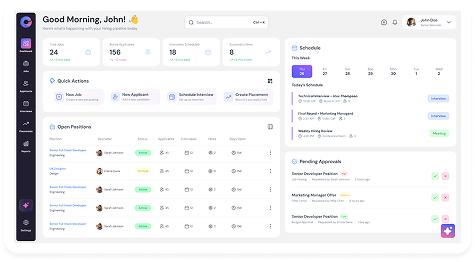In today’s dynamic work environment, managing a company’s workforce requires efficient and streamlined processes. This is where Human Resource Management Systems (HRMS) come into play. An HRMS is a software application that acts as a centralized hub for all your HR functions, automating tasks, simplifying workflows, and providing valuable data insights.
Think of an HRMS as your digital HR assistant, handling a wide range of tasks such as:
- Talent Acquisition: Streamline recruitment by managing job postings, applicant tracking, screening resumes, and scheduling interviews.
- Onboarding: Simplify the onboarding process by managing new hire paperwork, electronically storing documents, and creating onboarding checklists.
- Learning and Development: Track employee training progress, assign courses, and manage learning materials within the HRMS.
- Performance Management: Set goals, conduct performance reviews, and track employee progress using the system’s performance management tools.
- Compensation and Benefits: Administer payroll, manage benefits enrollment, and track employee leave balances.
- Employee Relations: Facilitate communication between employees and HR, allowing for internal reporting and case management.
- HR Reporting and Analytics: Generate reports on key HR metrics, such as time-to-hire, employee turnover, and training completion rates. This data can be used to identify areas for improvement and make data-driven HR decisions.
Benefits of Using an HRMS:
- Increased Efficiency: Automating repetitive tasks frees up HR professionals to focus on strategic initiatives.
- Improved Accuracy: HRMS software reduces the risk of errors associated with manual data entry.
- Enhanced Employee Self-Service: Employees can access pay stubs, benefits information, and request time off directly through the HRMS, reducing the burden on HR teams.
- Better Compliance Management: HRMS software can help ensure compliance with labor laws and regulations.
- Data-Driven Decision Making: HR professionals can gain valuable insights from HR data to make informed decisions about talent management strategies.
- Improved Communication: HRMS can facilitate communication between HR, managers, and employees, fostering a more collaborative work environment.
Different Types of HRMS Solutions:
- Applicant Tracking Systems (ATS): Focus primarily on recruitment and applicant management.
- Learning Management Systems (LMS): Specialize in managing employee training and development programs.
- Human Capital Management (HCM) Systems: Comprise a broader suite of features encompassing all aspects of HR management. HRMS often falls under the HCM umbrella.
Choosing the Right HRMS:
The ideal HRMS for your organization will depend on your specific needs and budget. Consider factors such as the size of your company, your HR priorities, and the level of functionality required.
The Future of HRMS:
HRMS solutions are constantly evolving, incorporating new technologies such as artificial intelligence (AI) and machine learning. These advancements can further improve efficiency, enhance the employee experience, and provide even more valuable data insights for strategic HR decision-making.
In Conclusion:
A well-implemented HRMS can be a game-changer for HR departments, streamlining processes, improving accuracy, and empowering data-driven decision making. By leveraging the power of an HRMS, organizations can optimize their human capital management strategies and create a more efficient and employee-centric work environment.

